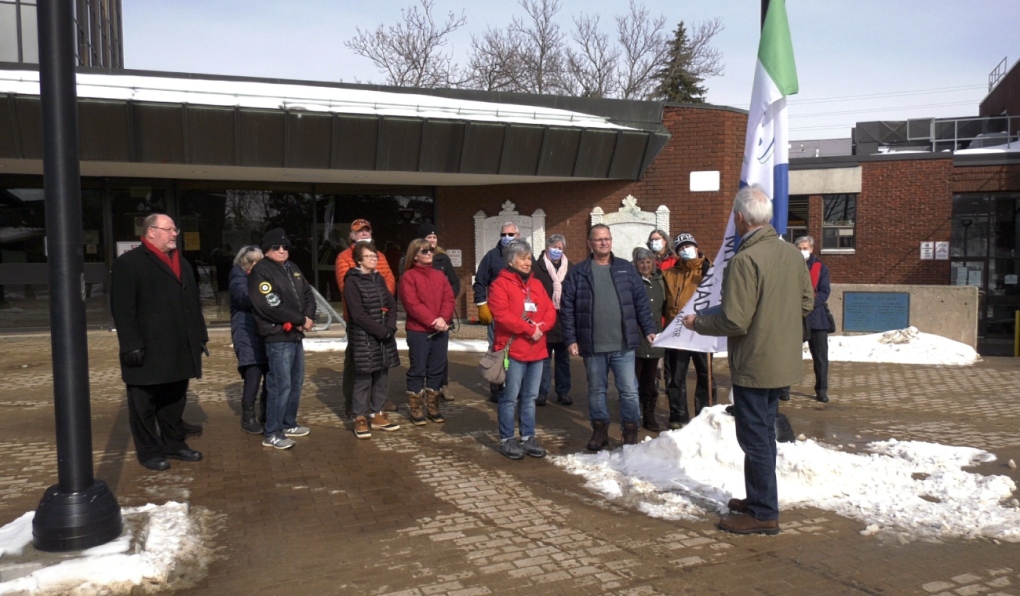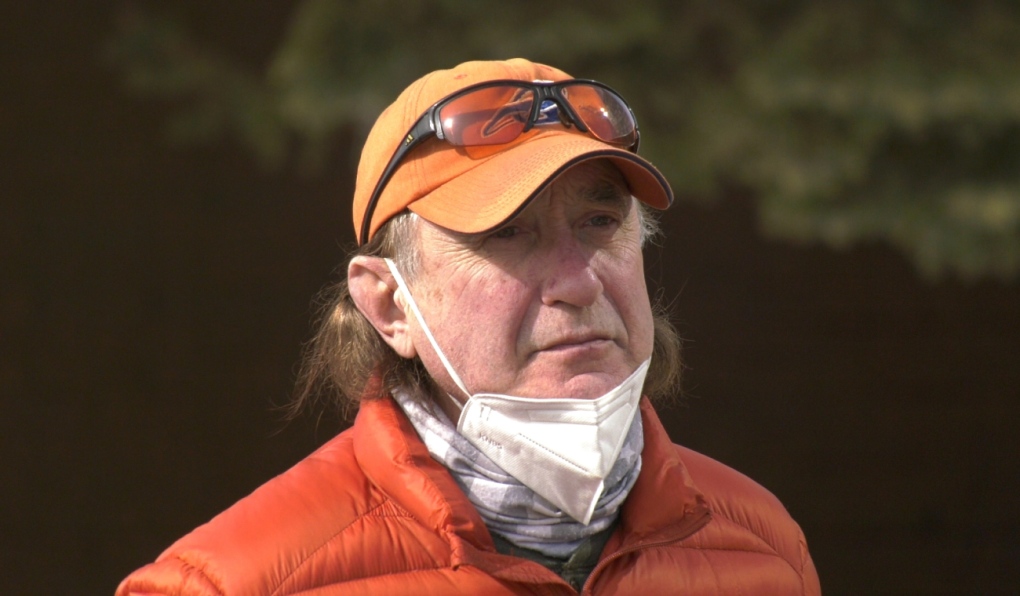North Bay raises ‘Myeloma Canada’ flag at city hall as month-long awareness campaign kicks-off
March marks Myeloma Awareness Month. Myeloma is little-known blood cancer that affected 4,000 new Canadians last year. For patients, diagnosis is quite often a long and difficult process.
 The myeloma community in North Bay raises flag at city call to raise awareness for the incurable disease. (Eric Taschner/CTV News Northern Ontarion)Wednesday afternoon, the myeloma community in North Bay raised a flag at city hall to continue speaking about this incurable disease.
The myeloma community in North Bay raises flag at city call to raise awareness for the incurable disease. (Eric Taschner/CTV News Northern Ontarion)Wednesday afternoon, the myeloma community in North Bay raised a flag at city hall to continue speaking about this incurable disease.
 Multiple myeloma cancer survivor Rob Paterson spoke with CTV News about his history with the disease following the ceremony. (Eric Taschner/CTV News Northern Ontario)While the flag was being raised, Rob Paterson, a multiple myeloma cancer survivor, reflects on his journey living with the blood cancer.
Multiple myeloma cancer survivor Rob Paterson spoke with CTV News about his history with the disease following the ceremony. (Eric Taschner/CTV News Northern Ontario)While the flag was being raised, Rob Paterson, a multiple myeloma cancer survivor, reflects on his journey living with the blood cancer.
“I still suffer today from all the side effects from the chemo and radiation I had,” he said.
Before being first diagnosed in January, 2008, Paterson started to experience back pain, bone pain and he was catching a cold all the time. His blood work results weren’t good. He then had to go through 16 bone marrow aspirations which detected the cancer.
During his treatment, he had to undergo stem cell transplants in 2008 and 2012, before a third in 2015 from his brother Mike.
“The myeloma metastasized into pre-leukaemia and I had to have another stem cell transplant," he said.
That successful transplant means seven years later, miraculously, he's now living cancer-free.
"They are calling me a medical miracle because there are no signs of multiple myeloma," said Paterson.
Myeloma is the second most common form of blood cancer. It is a cancer of the plasma cells which is produced in the bone marrow.
- Download our app to get local alerts on your device
- Get the latest local updates right to your inbox
Every day, 11 Canadians are diagnosed. In the Nipissing District, Myeloma Canada currently supports nine patients. But there are likely more patients with the disease, who are currently undiagnosed.
"We know that there are more than nine in the community and we really want to bring it forward to patients out there having symptoms to have it looked after so you get diagnosed early," said Erin Belzile, the support group leader.
Despite its growing prevalence, the disease remains relatively unknown and incurable.
"It can go undiagnosed for years. It often presents itself with pain, bone pain specifically because it is in your bone marrow. Often patients start with low back pain or hip pain,” said Belzile.
Advancements in research and treatment are enabling those impacted by myeloma to live better and longer lives than ever before, but more work needs to be done to find a cure.
“Where you take the plasma cells out of the patient’s body and you make them into warriors. So they can go back into the patient’s body and fight the cancer,” said Myeloma Canada’s Executive Director Martine Elias.
“This is called CAR-T. It’s a new treatment and it’s on the horizon.”
Elias said the Myeloma Canada offers support groups for people diagnosed to help them get through the trauma of a diagnosis. These groups also provide information about current available treatment options.
Paterson said he is optimistic continued research will one day find a cure, so future patients have a better chance at life like him.
“Hopefully they find something that is a cure,” he said.
For more information on the disease, visit the Myeloma Canada website.
CTVNews.ca Top Stories

Trump suggests the U.S. should take back the Panama Canal. Could they do that?
Donald Trump suggested Sunday that his new administration could try to regain control of the Panama Canal that the United States 'foolishly' ceded to its Central American ally, contending that shippers are charged 'ridiculous' fees to pass through the vital transportation channel linking the Atlantic and Pacific Oceans.
Weather advisories issued for GTA, areas north of Toronto ahead of 'significant' snowfall
Holiday travellers and commuters could be in for a messy drive on Monday morning as a significant round of snowfall moves into the region.
Man handed 5th distracted driving charge for using cellphone on Hwy. 417 in Ottawa
An Ottawa driver was charged for using a cellphone behind the wheel on Sunday, the fifth time he has faced distracted driving charges.
Wrongfully convicted N.B. man has mixed feelings since exoneration
Robert Mailman, 76, was exonerated on Jan. 4 of a 1983 murder for which he and his friend Walter Gillespie served lengthy prison terms.
What's open and closed over the holidays in Canada
As Canadians take time off to celebrate the holidays, many federal offices, stores and businesses will be closed across the country on Christmas Day and New Year's Day.
opinion Christmas movies for people who don't like Christmas movies
The holidays can bring up a whole gamut of emotions, not just love and goodwill. So CTV film critic Richard Crouse offers up a list of Christmas movies for people who might not enjoy traditional Christmas movies.
Can the Governor General do what Pierre Poilievre is asking? This expert says no
A historically difficult week for Prime Minister Justin Trudeau and his Liberal government ended with a renewed push from Conservative Leader Pierre Poilievre to topple this government – this time in the form a letter to the Governor General.
More than 7,000 Jeep vehicles recalled due to rearview camera display issue
A software issue potentially affecting the rearview camera display in select Jeep Wagoneer and Grand Cherokee models has prompted a recall of more than 7,000 vehicles.
'I'm still thinking pinch me': lost puppy reunited with family after five years
After almost five years of searching and never giving up hope, the Tuffin family received the best Christmas gift they could have hoped for: being reunited with their long-lost puppy.
































